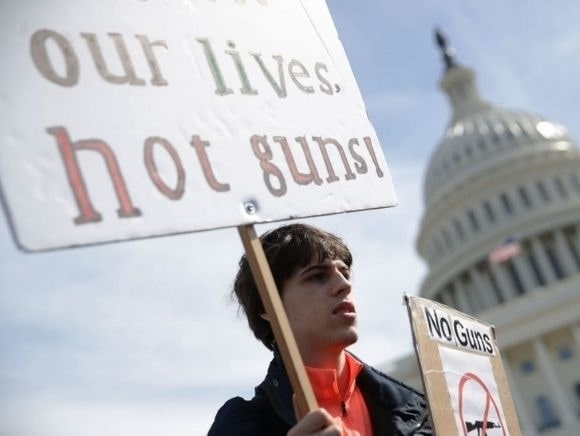
(Photo by Alex Wong/Getty Images)
The anti-gunner lobby is hoping beyond hope that it can convince, cajole, or coerce enough Republican lawmakers to give in to at least some demands for restricting gun ownership. Indications suggest some on the right might be willing to do just that. Several GOP senators have signaled that they might be open to accepting some gun restrictions in the aftermath of the school shooting in Uvalde, TX.
Democrats began their usual push for more gun control after a gunman killed 19 students and two teachers at Robb Elementary School. Most Republicans have balked at the idea of imposing more restrictions on firearms, pointing to mental health issues and lax security as true sources of the problem. Instead of targeting guns, they have recommended hardening schools with robust security measures, such as armed guards, metal detectors, surveillance cameras, and other tactics.
However, some Republicans seem to lean in the other direction. Senate Minority Leader Mitch McConnell (R-KY) told CNN on May 26 that he had met with Senator John Cornyn (R-TX) about having talks with Democrats to work out a legislative plan to combat mass shootings. Cornyn is set to meet with Senators Chris Murphy (D-CT) and Kyrsten Sinema (D-AZ) to begin negotiations.
During his interview with CNN, McConnell said:
“I met with Senator Cornyn this morning. As you know, he went home yesterday to see the family members and begin the fact-finding of this awful massacre, and I have encouraged him to talk with Sen. Murphy and Sen. Sinema, and others who are interested in trying to get an outcome that is directly related to the problem. I am hopeful that we could come up with a bipartisan solution.”
Cornyn affirmed that he would meet with Murphy, who has led the charge among Democrats on gun policy. Murphy said he was not sure whether they could reach common ground on background checks and other measures but said: “This hopefully will provide a new, greater sense of urgency.”
For his part, Cornyn insisted he was not willing to use the Uvalde shooting to infringe on Second Amendment rights. “There’s a whole list of things that we can consider, but I think particularly mental health, access to mental health treatment is high on that list,” he said.
The senator continued: “I think we need to be open to whatever, wherever the evidence leads us. I would say that this is not an excuse to infringe the Second Amendment rights of law-abiding citizens, doing that will do nothing to fix tragedies like this.”

Chuck Schumer (Tom Williams/CQ-Roll Call, Inc via Getty Images)
After previously saying there would be no vote on gun legislation, Senate Majority Leader Chuck Schumer (D-NY) did an about-face and indicated lawmakers would work to reach a bipartisan compromise. He did, however, acknowledge that such an agreement was a long shot. Schumer also cautioned that “this is not an invite to negotiate indefinitely” and that “if these negotiations do not bear fruit in a short period of time, the Senate will vote on gun safety legislation.”
Cornyn isn’t the only one willing to have the gun-control conversation with Democrats. Representative Adam Kinzinger (R-IL) seemed pretty gung-ho about the idea. In a conversation with CNN, he castigated his fellow Republicans in Congress: “What you’re seeing right now is all these politicians that are scared to death to talk about the gun issue. They know that this is an issue, but they’re scared to talk about it, so they launch into this thing about mental health,” he said.
The lawmaker argued that, while he believes mental health is an issue, he “highly doubts” those using it to avoid discussing gun control have supported funding mental healthcare. Like Democrats, Kinzinger slammed the idea of hardening schools, likening it to transforming them into “military camps.”
“If we think that just hardening schools — basically turning schools into military camps — is going to be the answer. Even if it does work, which it won’t, but even if it does, that isn’t the type of country I want to live in,” the representative said. “I have a kid that’s four months old now, will be going to school someday. I don’t want to have a military ID to check him in to the front gate of his elementary school.”
Kinzinger added that he is now open to banning AR-15s. Previously, he opposed a prohibition on the weapon. “It’s going to depend on what it looks like because there’s a lot of nuances on what constitutes certain things,” he said. “But I’m getting to the point where I have to wonder, maybe somebody to own one, maybe you need an extra license. Maybe you need extra training.”
Senator Roy Blunt (R-MO) also has signaled he would be open to passing more gun control legislation, specifically red flag laws. He recently told Politico he was open to discussions about these measures along with others to address mental health issues. “I’m very open to more red flag opportunities — though nobody has a stronger red flag than New York, I don’t think, and they just had an equally horrendous event,” he said after the shooting in Buffalo, NY.

Lindsey Graham (Photo by Ting Shen – Pool/Getty Images)
In the past, Senator Lindsey Graham (R-SC) has expressed support for red flag laws. After the Uvalde shooting, he said he would welcome a conversation on the matter. He and Senator Richard Blumenthal (D-CT) would prefer providing grants to states to encourage them to implement red flag legislation rather than passing a law at the federal level.
In total, about ten GOP senators have indicated that they are supportive of – or at least open to – imposing new gun control measures. Most have focused on red flag laws rather than pushing for bans on certain types of firearms. Even if Democrats manage to make an offer that some GOP lawmakers are willing to accept, it is doubtful they will have enough votes to get past the filibuster. At this point, it seems clear Democrats are not going to get their way on more extreme forms of gun control.
The majority of right-leaning lawmakers know their constituents would not favor legislation that makes it harder for law-abiding folks to obtain and own guns. The most Democrats can hope for might be watered-down red flag laws, but even this would be a bridge too far for most Republican voters. Either way, with the GOP set to retake Congress, it seems unlikely the anti-gunner crowd will get what it wants in this election year.
Remember to check out the web’s best conservative news aggregator
Whatfinger.com — the #1 Alternative to the Drudge

